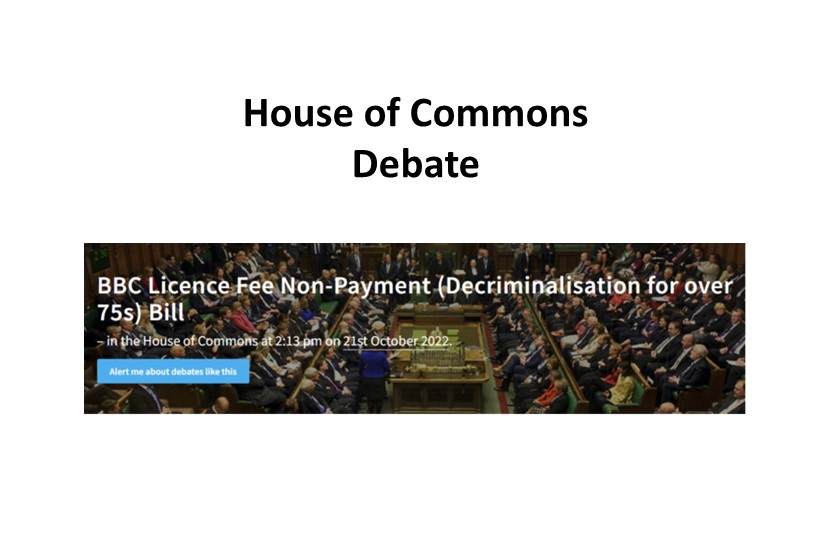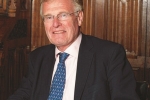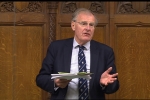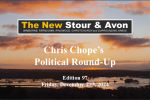
Chris Presents The 2nd Reading of His BBC Licence Fee Non-Payment (Decriminalisation for over 75s) Bill
Christopher Chope Conservative, Christchurch 2:13 pm, 21st October 2022
I beg to move, That the Bill be now read a Second time.
I am grateful to all colleagues who enabled a little time at the end of today’s sitting to discuss what continues to be a topical issue. People will have heard a report today that some 8 million people in our country are struggling with their bills. My view is that one bill that they should not be struggling with is the bill for the TV licence fee, which I would like to be abolished. Before we can get to that stage—the licence fee is guaranteed under the BBC charter until the end of 2027—we can try our best to mitigate its impact. This Bill is part of my ongoing campaign to try to persuade my Government to decriminalise the non-payment of the BBC licence fee. On the basis that it is better to try to deal with such issues in bite-size proportions, I have started with the group of people aged over 75 who always thought that when they reached that esteemed age, they would not have to pay the licence fee.
Because of some double-dealing on the part of the BBC when it was negotiating with the Government, we ended up in a situation where, contrary to people’s expectations and, apparently, to the Government’s wishes, the BBC insisted on keeping the BBC licence fee for all those aged over 75 who were not in receipt of benefits. We therefore have a situation where that group of people are vulnerable to being prosecuted for TV licence fee non-payment. I will tell hon. Members what is said by some of the experts in this area.
John Spellar Labour, Warley
I thank the hon. Gentleman for giving way. He has made clear his salami-slicing tactic and his attack on the BBC, which has been ongoing for some years. Did he notice in the meantime the BBC’s massive audiences during the events following the sad demise of Her late Majesty and the funeral? In the UK and around the world, people saw the immense quality of the BBC, which is a great British institution. Is this yet another example of the wrecking ball tactic used by some Conservative Members against the fundamental things that make this country great?
Christopher Chope Conservative, Christchurch
No, that is not my motivation at all. The coverage of Her late Majesty’s funeral was brilliantly carried out by all the broadcasting media, including the BBC. I have nothing but praise for the way in which the BBC dealt with that.
To take a topical example of why a number of people feel that the BBC is not being true to its charter, today we heard the sad news that Christian Matheson has been put in a situation where he has been suspended from the House for many weeks and, I understand, has chosen to resign and cause a by-election. Has that been prominently featured on the BBC news channels? I fear not. That is a topical example of the way in which some people feel that the BBC is rather selective in the way it deals with its news. My right hon. Friend Conor Burns, when he was at the Conservative party conference and in the days following, found himself on the receiving end of some public criticism, which was featured prominently on the BBC airwaves. The contrast between those two cases is an example of people’s concerns.
John Spellar Labour, Warley
I did notice the rather significant difference that one was a Government Minister and one was a Back Bencher.
Christopher Chope Conservative, Christchurch
They were both Members of Parliament. One of them has been suspended from sitting in this House for a recommended 10 weeks, I think, and one of them has not been suspended—there was no charge against my right hon. Friend the Member for Bournemouth West at all. In a sense, the right hon. Gentleman makes my point for me.
To return to what TV licensing prosecutions do, Tara Casey of the legal charity APPEAL says:
“TV Licensing prosecutions are the perfect example of the criminalisation of poverty. This has got to be wrong, particularly during a cost-of-living crisis.”
How many people are being prosecuted for TV licence fee non-payment? The latest figures that I have are that 49,144 people were prosecuted last year, 92% of whom were convicted. These prosecutions were dealt with in the courts, thereby creating public expense through the court hearings and a great deal of distress for the people—92%—who were convicted.
Shaun Bailey Conservative, West Bromwich West
At a time when our courts are under increased pressure, a prosecution over a TV licence is surely not a priority. Does it not make a farce of itself?
Christopher Chope Conservative, Christchurch
I agree. That is why I hope the Ministry of Justice, which is concerned about delays in the magistrates courts, will be saying, “How ridiculous that our magistrates courts should be taken up with cases of BBC licence fee non-payment.”
We talk about bureaucracy and the shortage of people in this country to engage in productive employment. The BBC has said that it wishes to return to the pre-pandemic level of visits to people’s homes in relation to the licence fee. In 2020-21, licensing officers from the BBC visited 671,500 homes, and 62,000 residents were found to have been using the BBC not in accordance with the rules. What an enormous volume of activity that involved—activity that I think we should be able to dispense with, and we would be able to dispense with it if we dispensed with the BBC licence fee, but we could take a staging point halfway if we prevented the BBC from being able to prosecute these normally hapless people.
In February 2020, the Government launched a consultation on the issue of decriminalisation. It took about a year for the results to be published. In their response, the Government were pretty damning about the criminalisation of those who do not pay the licence fee. Paragraph 70 of the report from the Department for Digital, Culture, Media and Sport states:
“After considering the consultation responses, the government remains concerned that criminal prosecution is, as a matter of principle, an unfair and disproportionate approach to enforcement of TV licence evasion in a modern public service broadcasting system.”
So there we have it, Madam Deputy Speaker. Paragraph 76 states:
“Against this background, the government therefore intends to continue assessing these potential impacts of an alternative sanction on licence fee payers. On this basis, while no final decision has been taken at this time, the government will keep the issue of decriminalisation under active consideration as part of the roadmap of reform of the BBC discussed below.”
I am delighted to see the Secretary of State on the Front Bench, but I hope that the Government are indeed “actively” dealing with this issue.
Damian Collins Chair, Draft Online Safety Bill (Joint Committee), Chair, Draft Online Safety Bill (Joint Committee), The Parliamentary Under-Secretary of State for Digital, Culture, Media and Sport
I thank my hon. Friend for what he has said, but, for the record, I am not the Secretary of State, although I am a Minister in the Department.
Christopher Chope Conservative, Christchurch
I am so sorry. In that case, the hon. Gentleman is even more welcome to his position. It is hard to keep up with some of the changes that are taking place on the Front Bench at the moment.
This issue needs to be addressed, and it is good to know that the Government are still considering it, but another year has passed and there is not much indication—not much that I have received, anyway—that the “active consideration” of the issue of decriminalisation is reaching any conclusion. In the meantime, as I have said, people are being prosecuted up and down the country, and people aged over 75 who thought they were going to have a free television licence are particularly vulnerable to such activity.
This is an important issue. Apparently a mid-term review of the BBC charter is taking place this year. We are told that the licence fee will remain at £159 until the beginning of April 2024. That means that if there were to be a general election after that, in 2024, people would be asking, “Why has the BBC licence fee just increased?” I am not sure it is very good timing, but that is the plan. The BBC is expected to receive £3.7 billion in licence fee funding this year. Why are people not more exercised about this? It is a television tax, and it is more than twice the cost of reducing the top rate of tax from 45p in the pound, about which there was a big argument at the Conservative party conference.
Putting it all in context, and as a party in favour of supporting hard-working families, I would have thought we would be taking action to commit ourselves to doing away with the television tax and, in the meantime, doing away with the criminalisation of those who do not pay the television tax.
John Spellar Labour, Warley
Will the hon. Gentleman confirm that, under a Labour Government, the over-75s got their television licence for free? George Osborne took that away, and it is the only reason why the over-75s are having to pay.
Christopher Chope Conservative, Christchurch
The right hon. Gentleman and I agree on a lot of things. I am not sure I would put it exactly like that, but the substance of what he says is correct. We used to have free television licences for the over-75s, and then, with a bit of smoke and mirrors, we suddenly found the system no longer applied. It was done under a Conservative Government, and he refers to George Osborne, who I am sure is prepared to take responsibility.
Damian Collins Chair, Draft Online Safety Bill (Joint Committee), Chair, Draft Online Safety Bill (Joint Committee), The Parliamentary Under-Secretary of State for Digital, Culture, Media and Sport
Just to confirm for the record that it was, of course, the BBC’s decision to end free television licences for the over-75s. It was ultimately the BBC’s decision.
Christopher Chope Conservative, Christchurch
So it was the BBC’s fault. My reading of it is that there was an attempt to cast responsibility on to the BBC, but ultimately it was the Government who enabled the BBC to put back in place a television licence fee—
Damian Collins Chair, Draft Online Safety Bill (Joint Committee), Chair, Draft Online Safety Bill (Joint Committee), The Parliamentary Under-Secretary of State for Digital, Culture, Media and Sport
The BBC agreed to a financial settlement with the previous Government that provided transitional funding, after which the BBC would take on responsibility. That was always the case, and it was the deal the BBC signed up to at the time.
Christopher Chope Conservative, Christchurch
Okay, so what happened? Did the BBC go back on the deal? If so, what was the sanction against the BBC? Why are we continuing to indulge the BBC as we are, by enforcing the £3.7 billion television tax paid to the BBC?
We have also given the BBC additional powers to raise the borrowing limits for its commercial activities, which are a great success. The BBC is selling a lot of important stuff overseas. Why do we need to subsidise that with taxpayers’ money? Why do we not let the BBC run its commercial arm with freedom, and without imposing additional costs on the hard-pressed taxpayer?
I have made a short point and, unfortunately, there is not time for the Minister to respond. We will have to continue the Second Reading of this important Bill on another occasion, when I hope the Minister will be able to respond in extenso.
Damian Collins Chair, Draft Online Safety Bill (Joint Committee), Chair, Draft Online Safety Bill (Joint Committee), The Parliamentary Under-Secretary of State for Digital, Culture, Media and Sport 2:29 pm, 21st October 2022
In the short time I have, I will address the concessionary licence fee for the over-75s and provide the necessary context for a range of relevant issues, including the BBC’s decision to end free TV licences for the over-75s, the Government’s work on decriminalising TV licence fee evasion and our broader road map for BBC reform, including our intention to review the licence fee funding model.
The House will no doubt be aware that, in the 2015 funding settlement, the Government agreed with the BBC that the responsibility for the over-75s concession should transfer to the BBC. The Government and the BBC agreed to make that change. Alongside that, the Government also closed the iPlayer loophole, committed to increase the licence fee in line with inflation and reduced a number of other spending commitments. To help with the financial planning, the Government agreed to provide phased transitional funding over two years to gradually—
Eleanor Laing Deputy Speaker and Chairman of Ways and Means, Chair, Standing Orders Committee (Commons), Chair, Standing Orders Committee (Commons)
Order.
The debate stood adjourned (Standing Order No. 11(2)).
Ordered, That the debate be resumed on Friday 28 October.
- ENDS -








